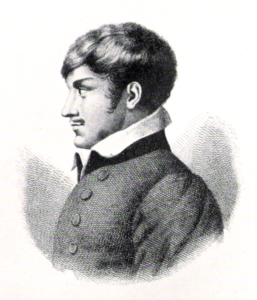At midnight
(Poet's title: Um Mitternacht)
Set by Schubert:
D 862
[December 1825]
Keine Stimme hör ich schallen,
Keinen Schritt auf dunkler Bahn,
Selbst der Himmel hat die schönen
Hellen Äuglein zugetan.
Ich nur wache, süßes Leben,
Schaue sehnend in die Nacht,
Bis dein Stern in öder Ferne
Lieblich leuchtend mir erwacht.
Ach nur einmal, nur verstohlen
Dein geliebtes Bild zu sehn,
Wollt’ ich gern in Sturm und Wetter
Bis zum späten Morgen stehn.
Seh’ ich’s nicht von ferne leuchten?
Naht es nicht schon nach und nach?
Ach, und freundlich hör ich’s flüstern:
Sieh, der Freund ist auch noch wach.
Süßes Wort, geliebte Stimme,
Der mein Herz entgegen schlägt!
Tausend sel’ge Liebesbilder
Hat dein Hauch mir aufgeregt.
Alle Sterne seh ich glänzen
Auf der dunklen, blauen Bahn,
Und im Herzen hat und droben
Sich der Himmel aufgetan.
Holder Nachhall, wiege freundlich
Jetzt mein Haupt in milde Ruh,
Und noch oft, ihr Träume, lispelt
Ihr geliebtes Wort mir zu.
I can hear no voice resounding,
No footsteps on the dark pathway;
Even the sky has
Closed its beautiful bright eyes.
Only I am awake, sweet life,
I am looking longingly out into the night,
Until your star in the barren distance
Wakes me up lovingly with its light.
Oh just once, if only furtively,
If I could see your lovely image just once,
I would happily stand in the storm and bad weather
Until late into the morning.
Can I not see something shining in the distance?
Is it not gradually getting nearer and nearer?
Oh, and I can hear it whispering in a friendly way:
Look, my friend is also still awake.
Sweet word, beloved voice,
Which makes my heart beat in sympathy!
A thousand blessed images of love
Have been stirred up in me by your breath.
I can see all the stars glowing
On their dark, blue course,
And in my heart and up there
The heavens have opened.
Beauteous echo, be friendly and cradle
My head now into a gentle rest,
And you dreams, continue frequently to whisper
Her beloved message to me.
All translations into English that appear on this website, unless otherwise stated, are by Malcolm Wren. You are free to use them on condition that you acknowledge Malcolm Wren as the translator and schubertsong.uk as the source. Unless otherwise stated, the comments and essays that appear after the texts and translations are by Malcolm Wren and are © Copyright.
☙
Themes and images in this text:
Blue Breath and breathing Dreams Echo Eyes Heads Hearts Heaven, the sky Longing and yearning Midnight Morning and morning songs Near and far Night and the moon Pictures and paintings Rest Rocking Stars Storms Sweetness Voices Whispering
Schulze headed each of the poems in his ‘Poetic Diary‘ with the specific date when he experienced these thoughts and emotions. In this case, he was careful also to specify that these lines are about his reflections at ’12 at night’ on 5th March 1815. The silence and the darkness of the middle of the night are vital for the poet, since he feels that it is only then that he can be sufficiently open to the quiet messages that are being whispered to him from the far distance, the realm of the stars that is the true domain of his beloved.
We should not be too surprised that at the beginning of the poem the stars are both invisible (‘heaven has closed its beautiful eyes’) and visible (‘the distant star sheds its light on me’), that the poet is both awake (‘only I am awake’) and at the same time is hoping to be woken up (‘until your star wakes me up with its light’). After all, it is midnight and the poet has entered a liminal world where inner reality is becoming more significant than external ‘facts’.
As the poet becomes convinced that the beloved has started to communicate with him, that the distant, unattainable star is conveying a quiet message to him, external reality is transformed. He can now see all the stars shining brightly and he can follow their course across the sky. He can hear an echo of this cosmic motion, a whisper that he interprets as a direct message from the beloved. He wants these sounds to lull him to sleep and he begs for rest and sleep so that he can open himself to the world of dreams. It is ultimately there, rather than outside in the ‘real’ world, that he can open himself fully to the messages he so much wants to hear.
☙
Original Spelling and note on the text Um Mitternacht Keine Stimme hör' ich schallen, Keinen Schritt auf dunkler Bahn; Selbst der Himmel hat die schönen Hellen Aeuglein zugethan. Ich nur wache, süßes Leben, Schaue sehnend in die Nacht, Bis dein Stern in öder Ferne Lieblich leuchtend mir erwacht. Ach nur einmal, nur verstohlen Dein geliebtes Bild zu sehn, Wollt' ich gern in Sturm und Wetter Bis zum späten Morgen stehn. Seh' ich's nicht von ferne leuchten? Naht es nicht schon nach und nach? Ach, und freundlich hör' ich's flüstern: Sieh, der Freund ist auch noch wach. Süßes Wort, geliebte Stimme, Der mein Herz entgegen schlägt! Tausend sel'ge Liebesbilder Hat dein Hauch mir aufgeregt. Alle Sterne seh' ich glänzen Auf der dunklen, blauen Bahn1, Und im Herzen hat und droben Sich der Himmel aufgethan. Holder Nachhall, wiege freundlich Jetzt mein Haupt in milde Ruh, Und noch oft, ihr Träume, lispelt Ihr geliebtes Wort mir zu. 1 Schubert changed 'dunkelblauen' (dark-blue) to 'dunklen, blauen' (dark, blue)
Confirmed by Peter Rastl with Schubert’s source, Ernst Schulze’s sämmtliche poetische Schriften. Dritter Band. I. Poetisches Tagebuch. […] Leipzig: F. A. Brockhaus. 1819, pages 89-90; and with Sämmtliche poetische Werke von Ernst Schulze. Neue Ausgabe mit sechszehn Kupfern. Dritter Theil. Leipzig: F. A. Brockhaus. 1822, pages 90-91.
To see an early edition of the text, go to page 89 [105 von 336] here: http://digital.onb.ac.at/OnbViewer/viewer.faces?doc=ABO_%2BZ170542803


